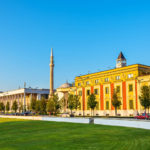Intro: Nicaragua is a scenic mountain-and-lake country with a variety of social and ethnic groups, including a sizeable LGBT population. Unfortunately most live behind closet doors as the dominant macho/catholic culture has a major influence on sexual lifestyles. But surprisingly, there are several bold and vigorous human rights organizations that are unafraid, especially since homosexuality was decriminalized in 2008 and a special LGBT ombudswoman was appointed by the government. (Spanish version)
Also see Gay Nicaragua News & Reports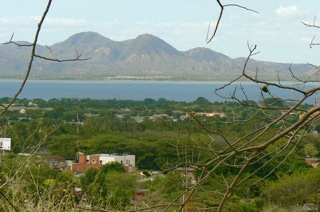
Also see Nicaragua Photo Galleries
By Richard Ammon
GlobalGayz.com
2010
Nicaragua is adventurous when arriving north by bus from Costa Rica along the Pan-American Highway. Only a few miles into the country the most spectacular vista opens up across Lake Nicaragua. It’s an enormous body of inland fresh water; with an area of 8,264 km2 (3,191 sq mi) it’s the largest lake in Central America. (Twice the size of the state of Rhode Island.) Adding more drama to the view are two volcanoes on the island of Ometepe, one of which issues daily reminders of smoke and occasional cinders.
Granada
Toward the north end of the lake is the town of Granada, a gem of a town with true ‘colonial’ appearance, due to the Spanish conquests that started in the 16th. The cobblestone streets are lined with ornate colorful facades, fancy wrought iron gates, tile roofs and the occasional horse drawn carriage.
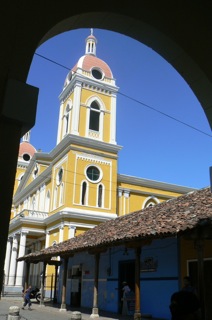 The 20th century produced a ragged history of civil wars, American ‘interventions’, bloody dictators, military coups, corruption, earthquakes, repeated hurricanes, guerilla warfare (the infamous Sandanistas), and now a moducum of peace despite the re-election of Sandanista Daniel Ortega.
The 20th century produced a ragged history of civil wars, American ‘interventions’, bloody dictators, military coups, corruption, earthquakes, repeated hurricanes, guerilla warfare (the infamous Sandanistas), and now a moducum of peace despite the re-election of Sandanista Daniel Ortega.
Regardless of the past, tourists love the present look and natives have virtually forgotten the original version of their culture as they scurry around in donkey carts, motorbikes, buses (former yellow school buses from the U.S.), SUVs for the upscale and old Suzuki Sidekicks (Geo Trackers) for those of modest means. The city appeals to North Americans looking for old world charm and to Europeans looking for warm winter weather.
About 80,000 people live here, a mix mostly of local folks and a sizeable colony of expats who happened into town and never left, building a first or second home or setting up a business.
Despite the veneer of sophistication that first class hotels, restaurants the area is humble. The vast majority of people live life close to the ground with farming and low tech manual work such as construction laborers, domestic help, street vendors, farmers or taxi drivers.
Unhappy Events
In 2010 GlobalGayz stayed in a small hotel called Joluva B&B in Grenada owned by two gay Belgians. In 2012 they were arrested and accused of underage child sex abuse. As of 2019 I have not been able to find out anything recent about the two men or the hotel so I have deleted their portion of this report.
Gay Nicaragua story continued:
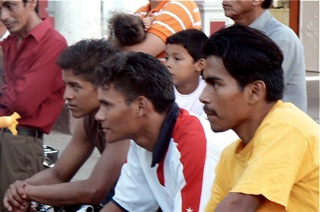 Nobody will publicly admit to being gay here; the risk is too great, risk of being ridiculed or rejected by family and friends and employers. The machismo facade presented by nearly every man is worn like a membership badge to a heterosexual club—in public. Appearing masculine is the standard Latino-Nico style that adheres to the hetero cultural mold. It is rare to see otherwise in the streets of Granada or Managua as poorest (most) to richest (few) trod off to work each day. In the poorest families the women go out to sell pencils or crafts or bananas on the street.
Nobody will publicly admit to being gay here; the risk is too great, risk of being ridiculed or rejected by family and friends and employers. The machismo facade presented by nearly every man is worn like a membership badge to a heterosexual club—in public. Appearing masculine is the standard Latino-Nico style that adheres to the hetero cultural mold. It is rare to see otherwise in the streets of Granada or Managua as poorest (most) to richest (few) trod off to work each day. In the poorest families the women go out to sell pencils or crafts or bananas on the street.
Behind Closed Doors
But for many, behind closed front doors the closets doors open to reveal a different reality, a subculture of fluid sexuality where many men and women fulfill themselves with a variety of choices. These varieties spread across the spectrum of human behavior from being transgender in full drag to casual bisex to anonymous encounters in a dark corner.
Our host said, “you should understand that being ‘gay’ in Nicaragua means something specific and narrow. It means dressing and acting like a woman, painting your nails and being a trans. It is a narrow stereotype most homosexuals avoid and so they deny being gay.” A homosexual is girlish only, the only image for being gay. Since there are virtually no famous gay people, no gay professionals, politicians, artists or pop stars, people don’t know what ‘normal’ gay is. There are no public role models. So it’s understandable why any young or old MSM person would deny the ‘weird’ trannie look and gay label.
Being Gay in Nicaragua
There are several ways of labeling gay here, from a public trans queen who is seen as a feminine/passive ‘maricon’ to the secretive masculine/active ‘cochon’. Some ‘heterosexual’ guys who deny their homosexuality but still like to play with other men are often called ‘mineros’. Regardless of the nuance, these identities have a derogatory reputation in public discourse, each denotes degrees of inferior male sexuality from fem to butch. (Other terms include ‘perra’, one who gets screwed a lot; ‘negra’ is a fem bottom. A playful term for a gay boyfriend is ‘novio’, fiancé.)
Missing in this litany is the category of ‘normal gay’, regular guys who are not any of the above, who range from business and professional people to police and firemen, students and teachers, lawyers and doctors or hotel workers—married or not. Such gay men are sometimes confusing to Nicaraguan straight guys because they don’t fit the fem/trans stereotype. It’s one of the reasons why the GayNic website has a masculine gay guy ‘chico of the month’ who does not look fem or trans.
Managua City and Viva Nicaragua
Charming and appealing as Granada is, it’s hardly the center of gay activity in Nicaragua. The much larger capital city of Managua is home to the politically active LGBT groups.
Through the internet we contacted a gay-owned B&B in Managua and called the owner to ask for directions. To our delight, he offered to come to Granada and pick us up. The drive was only half an hour and he wanted to meet the owners of Joluva B&B.
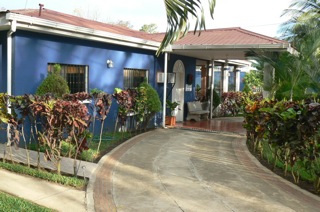
So we were chauffeured into the big city of nearly two million people by Lyndon, owner of Viva Nicaragua B&B, a manicured, leafy and quiet guest house on the outskirts of the city. (photo left)
Rather unusual to see in this dark-haired country, Lyndon has a shock of pure blonde hair, is light-skinned and is about as gringo one can be in appearance. But he’s also a shrewd businessman, from Minnesota, who purchased a language school in Managua also called Viva Nicaragua in 2004 that caters to foreigners who prefer personal instruction in learning Spanish; all lessons are one-on-one. Numerous U.N. organizations and embassies employ the school’s services.
Recently, Lyndon created a gay guide to life in Nicaragua: Gay Nicaragua.org that “offers information about gay life in Nicaragua. Here you will find a complete list of bars, hotels, restaurants, things to do and community organizations.” (Since our interview with Lyndon, he has retired back to Minnisota,)
Sex by the Swimming Pool
One morning after breakfast by the pool he and I talked about his observations of Nicaraguan masculinity and sexuality.
From his experiences, sexual (few) and social (many), he noted that some comfortably married guys seemed easily willing to be sexual with another guy. “I ‘dated’ one guy who was not gay to himself or others, who cared for his family and loved his kids and supported his family and went home to them nearly every night and did not go with other women. He actually initiated our first sexual encounter, and he was not an aggressive person. He suggested it in a modest casual way.”
“This surprised me. I expected a homophobic reaction from this machisto as I slowly let him know about me, but instead I got curiosity, desire and a come-on.”
The man came from a rural peasant family where education is minimal and manual work is the usual way of life. Entering into Lyndon’s world was like Alice in Wonderland: a middle class American style house with five separate bedrooms, indoor plumbing, running hot water, air conditioning, a swimming pool and a thick mattress.
“What was he doing here,” Lyndon wondered. If he wasn’t gay how was it that he was so sexually comfortable with another man? Was it just a sexcapade with an exotic blonde? Lyndon now thinks not. “His sleeping with me was about more than orgasm, I believe.”
I probed Lyndon’s thoughts more to hear what his take was on this situation. He obviously had thought a lot about it and was only too glad to find an engaged listener.
The Four P’s of Sex
“My theory is that it has to do with power, penetration, pleasure and prestige.” Lyndon continued. “The guy was always the top, with his wife and with me, so he got to dominate and have power, which validated his masculine self image as the penetrator from which he derived pleasure. And in topping me, an older higher-class gringo, he probably felt a sense of prestige, of gaining status. He won the prize, so to speak; he got to be the rooster who owned the hens.
“In that sense we were compatible; I liked being dominated. I put my head on his chest and felt cared for. I liked being cradled and handled by a masculine partner.
“So, my insight into Latino sexuality, especially a sexuality among the less privileged, is that of a free-floating urge to experience momentary power in a world where the they are ultimately powerless. And since he liked both his wife and me in intimate moments, it appeared the gender of the partner was less important. “I’m no expert here but these are my ideas based on my ‘research’,” Lyndon laughed. “I’m sure he had no clue about any of this.”
LGBT Groups
After that heady chat with Lyndon, I went into the city to meet with several LGBT organizations and activists. (There are no politically LGBT activists in Granada.)
Nicaragua’s criminal code, which came into force in 2008 decriminalized homosexuality and now punishes discrimination with prison sentences of six months to one year, or fines.
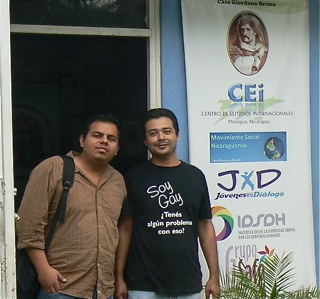
Fortunately, meeting the LGBT groups was easy to do since all but one share the same office location under one roof. There are four leading LGBT groups in Managua:
-Sexual Diversity Initiative for Human Rights (IDSDH)
-Grupo Safo (Lesbian group)
-Centre for International Studies (CEI)
-Nicaraguan Association of Transsexuals (ANIT)
Together they make up a central alliance called the Strategic Group for Sexual Diversity Rights (GEDDS).
1-Sexual Diversity Initiative for Human Rights (IDSDH)
This is the largest LGBT organization in the country. Bismark Moraga, is the coordinator of IDSDH www.idsdh.org. Marvin Mayorga is a volunteer who showed me around their home base. He and others willingly spent time helping me to understand their activities, especially since Bismark spoke no English and I no Spanish, so Marvin translated, which always make an interview more difficult. Subtle meanings and innuendos are lost. Also present was Vladimir Ernesto Reyes-Garcia—another volunteer.
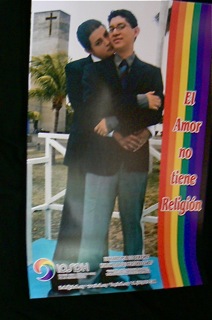
IDSDH is the most politically active of the groups and as the members describe their activities it feels as if I’m sitting with four Davids facing the goliaths of government, religion, military and Nicaraguan machismo.
With a modest budget and only four paid staff, backed by 20 core volunteers and 50-60 more supporters, IDSDH is an in-your-face force on behalf of homosexuals and victims of sexual abuse everywhere in the country. Over the past 5 years they have been banging on closet doors and going public with their human rights message. They offer health, gender and diversity seminars in rural and urban settings.
They outreach to universities where they have been welcomed. A film project at the Jesuit University has made a diversity educational film as part of their journalism program and is now integrating the film into their interdisciplinary gender studies program. It’s the first LGBT theme film made in Nicaragua. Bismarck said they want to take the film to seminars beyond the university but they face problems of resistance from rural areas, and the problem that gays will not attend out of fear if the seminar is too ‘out’.
Once a month they stage a very public demonstration or ‘plantone’ on one of Mangua’s busiest traffic rotaries, Rotunda Reuben Dario. With permission from the police chief (who denied their first request four years ago) IDSDH builds a platform stage, turns up the music, raises rainbow flags and starts singing. This turns to speeches about human rights, gay rights, women’s rights and equality for all citizens. “We do this to visualize our rights; to show that homosexuals exist here,” said Marvin.They mount large billboards (photo right) around the city with slogans and images advocating LGBT and human rights. This is in addition to their annual human rights parade on one of the major roads in Managua.
See March for Human Rights in Managua 2009Currently they have just finished up the country’s first major survey that will reveal actual hard data on sexual diversity in Nicaragua in order to press for new legislation regarding rights and protections for all sexual minorities from all ethnic groups. “We want respect, legal and social, not pity from the government,” said Bismarck. There are 45 human rights organizations in the country, both local and international, but IDSDH is the only one focused on LGBT affairs.This is impressive in a country with a recent history of guerilla warfare and disappearances of countless people; in a highly catholic country; in a country where homosexuality has only been officially legal for two years. They are not wasting time.
New Times Bring Change
Bismark the coordinator of IDSDH, wearing a T-shirt with bold print ‘soy Gay’ (I am gay), described an unusual aspect of their recent progress: “Believe it or not, the Sandanista that no one likes except themselves, they are actually a bit more tolerant to us that the previous government. They lean socialistic and that means, in a sort of way, equal rights–up to a point. They are very corrupt behind closed doors but Ortega pretends to be for all the people.”In addition to the street noise, IDSDH has lobbied quietly with government members, most importantly with the minister for human rights in Nicaragua, Omar Cabezas, who was aggressively persuaded to attend the most recent Central American LGBT conference held in Managua.
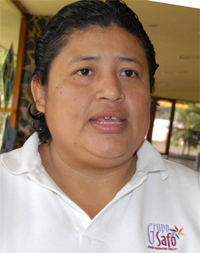 At that conference he obligated himself to appoint a special ombudsperson for the LGBT population. In 2009 he made good his promise and appointed Samira Montiel to that position. Montiel (photo left) was suggested by the GEDDS collective since she was a respected lesbian activist and a member of the Safo lesbian group.
At that conference he obligated himself to appoint a special ombudsperson for the LGBT population. In 2009 he made good his promise and appointed Samira Montiel to that position. Montiel (photo left) was suggested by the GEDDS collective since she was a respected lesbian activist and a member of the Safo lesbian group.
In an interview after her appointment, Samira said her time as a public official serving a cultural minority “will transcend issues like promoting same-sex marriage or adoption of children by same-sex couples, both of which are illegal at present.
“’My agenda goes beyond such specific goals. I will take legal action against abusive practices and institutional discrimination against gay, lesbian, bisexual and transsexual people, and anyone else who feels they are unfairly treated because of their sexual identity,’ she said.
“In her new post she will work for policies to guarantee access to the public health system, laws for the respect of labor rights, and an end to hostility toward minorities and sex education in the public education system, among other things. <The government has traditionally resisted sex-ed because of church opposition to abortion and sexual diversity issues. But the new Sandinista FSLN regime leans more open and is pushing back against the church. IDSDH hopes to expand its educational seminars.>
“All our lives we have lived with contempt and violence; now it’s time to end this discrimination, and for society not only to accept us, but to recognize us and respect our way of thinking.”
Also see: Human Rights Report
2-Safo lesbian group
Safo is small compassionate group of lesbians who care for one another and for other lesbians going through the double trauma of coming out and divorcing their husbands. The experience is compounded by angry—sometimes violent–spouses who try to turn the children against their mothers in an attempt to take them away.
Also see: http://www.youtube.com/watch?v=-Zv3-QHH4IQ
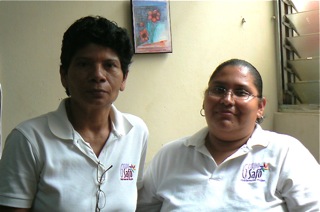 “Our most important work is to empower lesbians through training workshops and video forums. We also work with families and children of lesbians to teach a new model of family. Currently we have 15 lesbians with kids that we are counseling,” said Rosa Salgado, (at right in photo) the coordinator for families and children. In Managua there are five coordinators in Safo and 30 nationwide.
“Our most important work is to empower lesbians through training workshops and video forums. We also work with families and children of lesbians to teach a new model of family. Currently we have 15 lesbians with kids that we are counseling,” said Rosa Salgado, (at right in photo) the coordinator for families and children. In Managua there are five coordinators in Safo and 30 nationwide.
They also use the internet to coordinate their work, especially for young women who cannot come out because of their family circumstances. Online may be their only link with support. Many don’t come out and agree to marry and have kids only to seek divorce later on. “The stigma against lesbians is greater than men,” said Rosa “because they break a powerful cultural tradition of obedience and weakness for women. For them, the family is the big oppressor.”
The group also advocates for LGBT rights and helps make noise in the annual march.
Also see:
Safo website (English translation here)
Safo in Human Rights March 2009
3-Centre for International Studies (CEI)
I did not visit the CEI office as it is located some distance away from the main GEDDS office. CEI is a contributor to GEDDS through education and research about organizational strategies to increase the GEDDS’ effectiveness in dealing with national and international issues. An organization is only as effective as it strategies to achieve its goals and GEDDS is fortunate to have such an advisory group.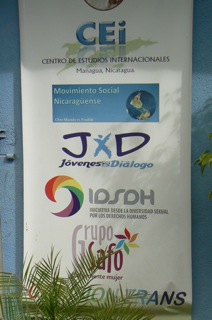
Their website announces, “we contribute to the construction of solidarity and capacities of communities and marginalized poor and victims of violence of “globalization” in its military expression, political, environmental, economic and cultural.”
“We work with networks and social movements as a way to build strength and nonviolent alternatives to support democracy, gender and social equity and environmental protection. We promote transformative capacities for conflict resolution.”
4-Nicaraguan Association of Transsexuals (ANIT)
Next door to the IDSDH office is the headquarters of Nicaragua’s most discriminated community–transgenders and transsexuals. There I had the privilege of talking to a modest soft-spoken woman named Athiany, one of the founders of the Nicaraguan Association of Transsexuals (ANIT) in 2008.
ANIT has only 10 members but has about 50 supportive friends. “Our most important work is in legal matters; we advise trans people about their rights and how to make effective complaints to the police.” she said.
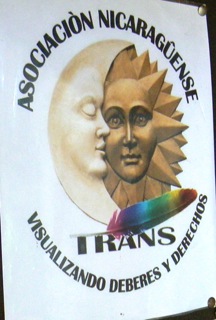 This is not surprising since trans are highly stigmatized and disregarded by the legal system. They also do counseling in trans workshops and at conferences. They are a compassionate support group for women victims of violence and discrimination in school, work and in public.
This is not surprising since trans are highly stigmatized and disregarded by the legal system. They also do counseling in trans workshops and at conferences. They are a compassionate support group for women victims of violence and discrimination in school, work and in public.
ANIT also tries to educate trans people about respecting social norms (they are sometimes defiant in their anger) as a way to avoid trouble and very importantly, they work to combat the myth that all trannies are sex workers and troublemakers.
Even at first glance it is easy to see how trans people are one of the most alienated communities. Athiany looks different, not fully masculine or feminine. With her dark hair, long face and penetrating eyes she is an unsettling figure in a world that has been traditionally divided into male and female. Her appearance is carefully cultivated to minimize her original male features. She succeeds but not completely and the result is apparent, a blend of genders that does not clearly signify one or the other.
But once past the initial impression, her demeanor is clearly feminine: soft, gentle, gracious and unassuming. She spoke of the tribulations and pain of her community. Many trans people who exhibit their opposite-gender tendencies early in life are much discriminated against and are turned away from normal life opportunities such as a safe home and a school education. Many as adults can’t read and as a result develop poor professional skills and are forced or coerced to turn to sex work–but not most, said Athiany firmly. (IDSDH has a upcoming program to train school teachers in sexual diversity, funded but the Norwegian embassy).
They are often employed as hairdressers or in ‘informal commerce’ such as street sales of merchandise, waitresses or kitchen help.
Most trans people in Nicaragua are not full transsexuals since they cannot afford the surgery, which is commonly done in Mexico or Spain. So many settle for hormone injections that are self-injected because sex hormones cannot be legally sold over the counter. Some desperate trans resort to injecting mineral oil in their breasts or hips, which is both dangerous and painful.
But all is not heavy and serious, said Athiany. At the Pantera Club in downtown Granada there is a festive drag show every few months. It’s a popular contest that draws about 10 contestants each time and a big audience that loves the show.
Also see:
Gay Nicaragua Guide – bars, lodging, events + more
Information About Gay in Nicaragua
Story of Trans Torture (1999)
Story of Trans Murder (2007)
HIV and Trans People (2008) pdf
Other NGO Health Organizations
There are numerous other NGO health organizations in the country, both secular and religious-based. Two mentioned during my visit were:
Foundation XOCHIQUETZAL was founded in 1990 and carries out programs aimed at HIV-positive children and adolescents who have been the target of sexual abuse.
NIMEHUATZ Foundation, headed by Reta Aranz, is a nongovernmental and community-based nonprofit dedicated exclusively to the prevention of HIV and AIDS by promoting and defending the human rights.
Also see report on youth sex: http://www.advocatesforyouth.org/index.php?option=com_content&task=view&id=700&Itemid=336
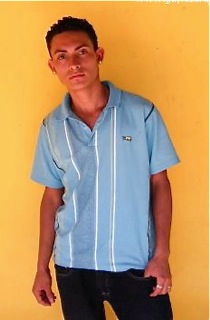
The Gay Scene in Managua
There is no single area with multiple gay venues; there are few gay places. There is a gay disco named Tabu for middle class people and another, Q disco, a smaller venue that tends to draw higher class gays–and a welcoming gay B&B.
(photo right from www.gaynicaragua.net)
Gay sites:

